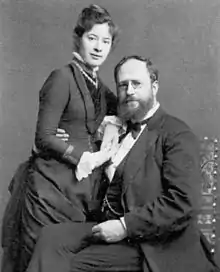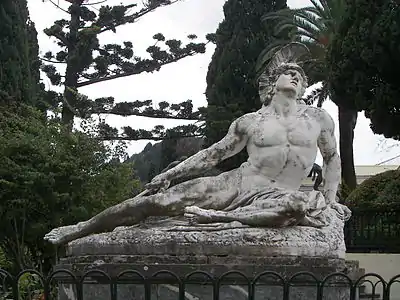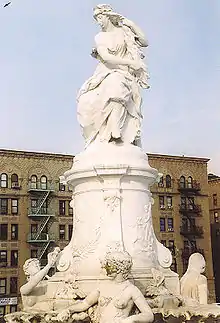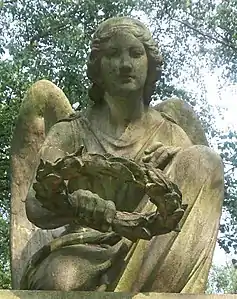
Ernst Gustav Herter (14 May 1846, Berlin – 19 December 1917, Berlin) was a German sculptor. He specialized in creating statues of mythological figures.
Life and work
Herter studied at the Academy of Arts in Berlin and later also as apprentice of Ferdinand August Fischer, Gustav Blaeser and Albert Wolff. In 1869 he created his own studio. In 1875, he made a study trip to Italy. Professor Herter was a member of the Prussian Academy of Arts.
On 8 July 1899, Herter was present in New York when his Heinrich Heine memorial sculpture, known as the Lorelei Fountain, was unveiled in The Bronx, New York City. The Lorelei Fountain was originally intended for Heine's city of birth, Düsseldorf, to mark the centenary of his birth. This project was squelched due to the antisemitic and nationalistic sentiment that pervaded the German Reich at that time.[1]
Among his most famous works is Sterbender Achill (Dying Achilles), created in Berlin in 1884. The statue was acquired by the Empress of Austria and became the centerpiece at her palace Achilleion in Corfu, Greece. His second original sculpture of Dying Achilles is in Poland in Elbląg at Łączności street opposite the City Hall. It was a gift from the German Ministry of Culture and Arts.
Selected sculptures
 Dying Achilles, Achilleion Palace,
Dying Achilles, Achilleion Palace,
Corfu, Greece
 War Memorial, 1875, Berlin-Spandau
War Memorial, 1875, Berlin-Spandau The Rare Catch, 1896
The Rare Catch, 1896
Viktoriapark Berlin_Orpheus%2526Ernst_Herter%25261902.jpg.webp)
 The Muse Terpsichore, 1909, Thorn
The Muse Terpsichore, 1909, Thorn
References
- ↑ Richard S. Levy (2005). Antisemitism: A Historical Encyclopedia Of Prejudice And Persecution. ABC-CLIO. p. 295. ISBN 978-1-85109-439-4. Retrieved 9 December 2012.
The most notorious of the endeavors, the Lorelei Fountain, intended for Heine's home city of Düsseldorf, was designed by a prominent monument specialist, Ernst Herter, whose fee was to have been paid by a fervent admirer of Heine....
External links
![]() Media related to Ernst Herter at Wikimedia Commons
Media related to Ernst Herter at Wikimedia Commons